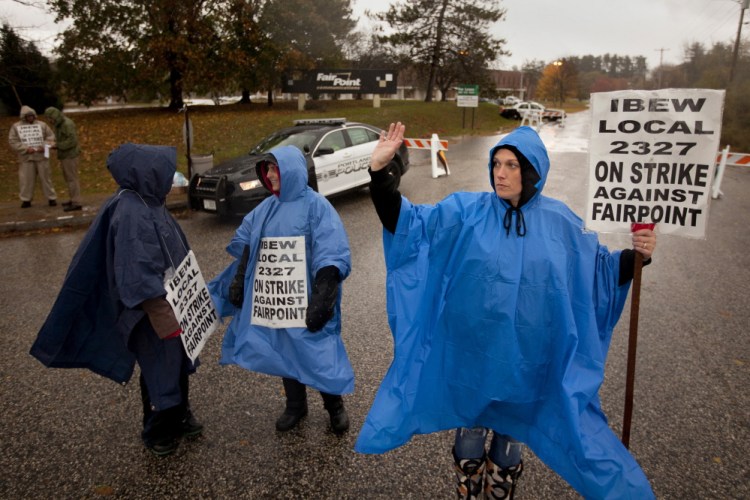Hundreds of Maine workers on strike from FairPoint Communications are girding for a protracted labor dispute with the telecommunications company.
FairPoint, meanwhile, has requested a police detail to watch over picketing employees at two locations through the end of the month, according to Falmouth Police Chief Ed Tolan.
At one of the picketing sites in Portland, Matt Hayes, a striking splice service technician, said he has been saving money for about a year, preparing for the walkout at the direction of his union, whose leaders anticipated the work stoppage.
“Today was our last paycheck,” Hayes said Thursday, as rain streamed down on the few die-hard strikers who braved the torrential nor’easter. Hayes said his family is financially prepared for him to remain on the picket line for three months.
“Hopefully it doesn’t come to that,” said Hayes, 36. “Some people have already made arrangements for secondary employment.”
About 2,000 Fairpoint employees in Maine, New Hampshire and Vermont walked off the job at midnight Oct. 16, after six months of disagreements between the company and its unions over terms of a new contract. The previous contract ended Aug. 2, after the unions had authorized a strike in July.
Tolan said FairPoint is paying to station one Falmouth officer and at least one Portland Police Department officer to watch over picket sites at both ends of Davis Farm Road, which crosses the Portland-Falmouth line.
Tolan said his officers’ contract stipulates that strike details are charged at double time. That means, depending on an officer’s rank and seniority, FairPoint is paying roughly $70 an hour to have an officer at the picket line in Falmouth.
So far there have been no incidents with strikers that required any Falmouth officer to file a report, Tolan said. Strikers have followed the rules police have set out, which allow picketers to make emphatic motions and yell at incoming vehicles they believe to be occupied by FairPoint management, but they are not permitted to touch or stop cars or purposely step into the path of an oncoming vehicle.
The picketing employees have stayed within those guidelines, Tolan said.
“As long as it continues that way, we’ll keep one officer over there,” Tolan said. “If we have to go two, we’ll go two, and FairPoint is on board with that.”
Pete McLaughlin, a spokesman for the two unions representing the workers, has said the company refuses to back off its demand for roughly $700 million in contract concessions.
The company says it must lower labor costs to remain competitive.
Negotiations stalled in late August, when a committee of union representatives submitted a proposal they said would save the company about $210 million. FairPoint rejected the proposal within hours and said negotiations were at an impasse. It then unilaterally implemented a contract it had proposed in April, a move the company contends is legal according to federal labor law.
“(FairPoint Communications) would prefer negotiated agreements, but feels the offer being implemented … is fair to its hardworking and valued workforce. It is regrettable that the issues could not be resolved through bargaining,” Angelynne Amores Beaudry, FairPoint’s communications director, said in a written statement Aug. 28.
The unions filed three complaints with the National Labor Relations Board challenging the legality of the imposed contract. The board dismissed two of the bad-faith charges against FairPoint, but continues to investigate a third.
The new contract freezes the old pension and will require workers to contribute to health care costs for the first time.
Ellen Messing, a labor attorney at Boston-based Messing, Rudavsky and Weliky, is not involved in the FairPoint case, but said typically that charges of bargaining in bad faith made to the NLRB trigger an investigation that can sometimes take weeks.
If the charge is substantiated, the NLRB will file a complaint against the party found to have violated labor laws. The dispute would then go before an administrative judge if the parties cannot come to an agreement before then.
Occasionally, Messing said, the charge to the NLRB, or the filing of a complaint by the agency is enough to bring the parties back to the table.
“Sometimes efforts are made to break the log jam,” she said.
Copy the Story LinkSend questions/comments to the editors.




Success. Please wait for the page to reload. If the page does not reload within 5 seconds, please refresh the page.
Enter your email and password to access comments.
Hi, to comment on stories you must . This profile is in addition to your subscription and website login.
Already have a commenting profile? .
Invalid username/password.
Please check your email to confirm and complete your registration.
Only subscribers are eligible to post comments. Please subscribe or login first for digital access. Here’s why.
Use the form below to reset your password. When you've submitted your account email, we will send an email with a reset code.